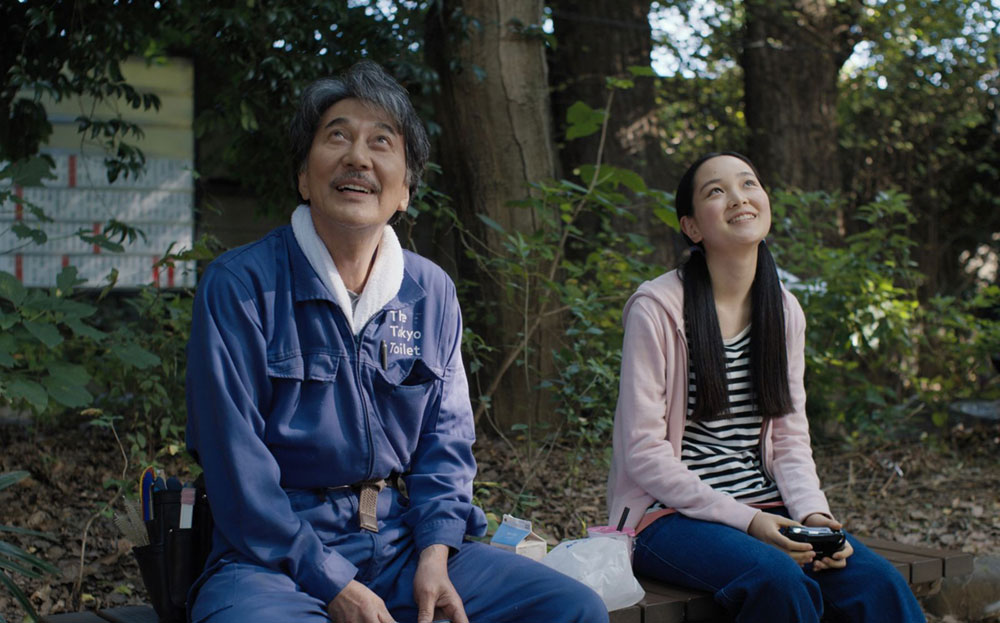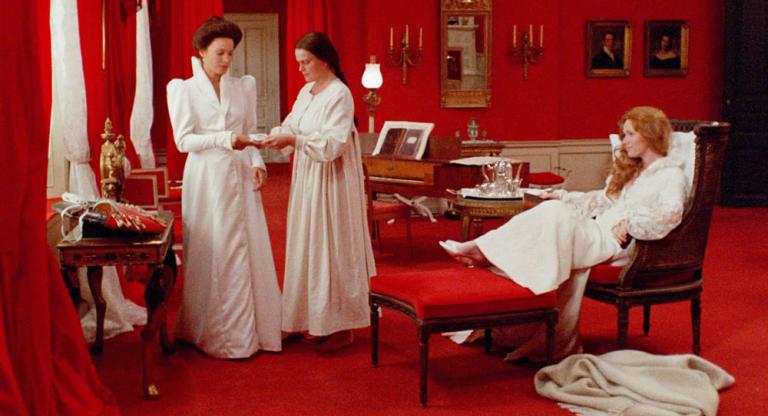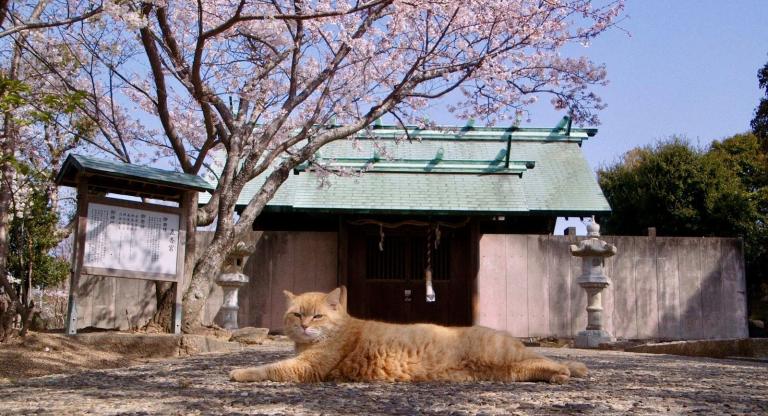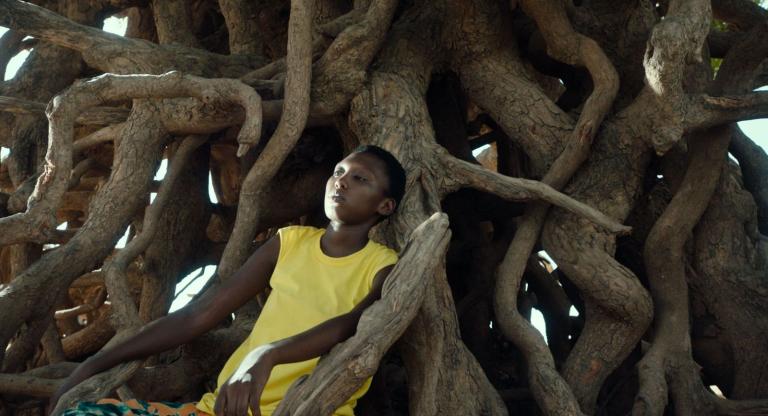Wim Wenders is one of contemporary film’s greatest romantics. In his latest film, Perfect Days, the 78-year-old German director’s still tender and mysterious cinematic heart contemplates daily life’s minor dramas, finding poetry in things as mundane as using a vending machine or cleaning a toilet. Set in Japan (and completely in Japanese), the film follows Hirayama (Koji Yakusho), whose nearly monastic life is anchored by his job cleaning public bathrooms. The middle-aged Hirayama travels from bathroom to bathroom in his van, listening to a collection of precious cassettes which include Patti Smith, The Animals, and, most notably, Lou Reed. Every day is largely the same, but as things proceed small variations emerge, giving Wenders’s minimalist film a music all of its own. Hirayama’s commitment to his routine leads him to become acutely attuned to life’s most fleeting wonders, particularly the play of sunlight through trees, which in Japanese is called komorebi.
In light of Wenders’s often ambitious cinema, which has included large international casts and experiments with 3D technology, Perfect Days stands out as a startlingly direct, profound, and bracingly human film that draws us in with its guileless vision of life’s beauty to show us that life’s smallest repetitions can reveal joy. The director took the time to speak with me about his latest film, working with the incredible Koji Yakusho, the importance of komorebi, dreams, and, of course, Lou Reed.
CS: Thank you so much for talking with me, I loved the film.
WW: Thank you so much. Let me see the top of your T-shirt. What does it say? Film Forum! I have the same T-shirt.
CS: Wow! Cool! Now, with regard to your film. Komorebi, in a cinematic context, seems to connect with Ozu's pillow shots. And I know he's an artist that you have made a film about and admire. Could you talk about Ozu and if he was an inspiration for this film?
WW: Our man is called Hirayama because that's the name of Ryu Chishu’s character in Tokyo Story [1953]. But we didn't want to make a film à la Ozu. We wanted to make a contemporary film. But, there is a lot of Ozu in there: in Hirayama’s attitude, his dedication, and the care he gives to everything. He is a lot like the old fashioned characters in Ozu’s movies. Ozu was present, we knew that we made this film 60 years after his death, but he was sort of the film’s guardian angel.
CS: Could you talk more about komorebi, because that spirit of the fleeting moment, seems to really characterize the whole film.
WW: It is an essential element of the story, the script, and of the character, who is somebody who notices and is aware of these moments, as well as the presence that they represent. The sunlight shining through the trees that are slowly swaying in the wind and the leaves create this extremely beautiful passing spectacle sometimes, and it's just for one person most of the time, because most people go by and don't see it.
I wrote a biography for Hirayama in which the presence of komorebi saved his life at one moment. It made him a different person when he became aware that you could see so much that other people do not see. He chose to be a simple caretaker and a serviceman because he realized that the life he had before didn't give him any pleasure. He lives a life with little, but at the same time with a lot—komorebi plays a big part in it. That's why we also decided that we would see reflections from his day in his dreams. Again, these reflections were of many leaves and trees in the wind, and every now and then you see another little fleeting moment from that day. In those dreams, I think komorebi is very present and it really lets you look deeply into Hirayama's soul.
CS: Dreams and their connection to the subconscious is something that I've seen throughout your work. In Until The End Of The World [1991] and Hammett [1982], scenes from daily life seem to come back in the form of dreams. Can you talk about the place of dreams in your life and in your films?
WW: Dreams are an important element in a lot of my films. In Until The End Of The World, people learn to record their dreams in the future and that becomes a disease. Today, sometimes I see people on the street, or on the subway, looking at the little screens in their hands the same way the people in my science fiction film from 30 years ago looked at [their screens] and got sick from them because they caught the disease of narcissism. Sometimes I feel we all caught that disease that I first got a glimpse of in Until The End Of The World.
Not everybody remembers their dreams. I went through a long psychoanalysis when I was a young man and part of it was to try to remember my dreams. I actually learned how to remember dreams. You can only remember them when you write them down right away, as soon as you wake up. For me, dreams are a very integral part of life and this film is very much about life and how to live. After all, it's a question that concerns us very much in this day-and-age. We all came out alive from the pandemic and we all probably thought we'd live differently afterward, but we didn't and now we find ourselves in a bigger mess than before. Perfect Days is a film about how to live.
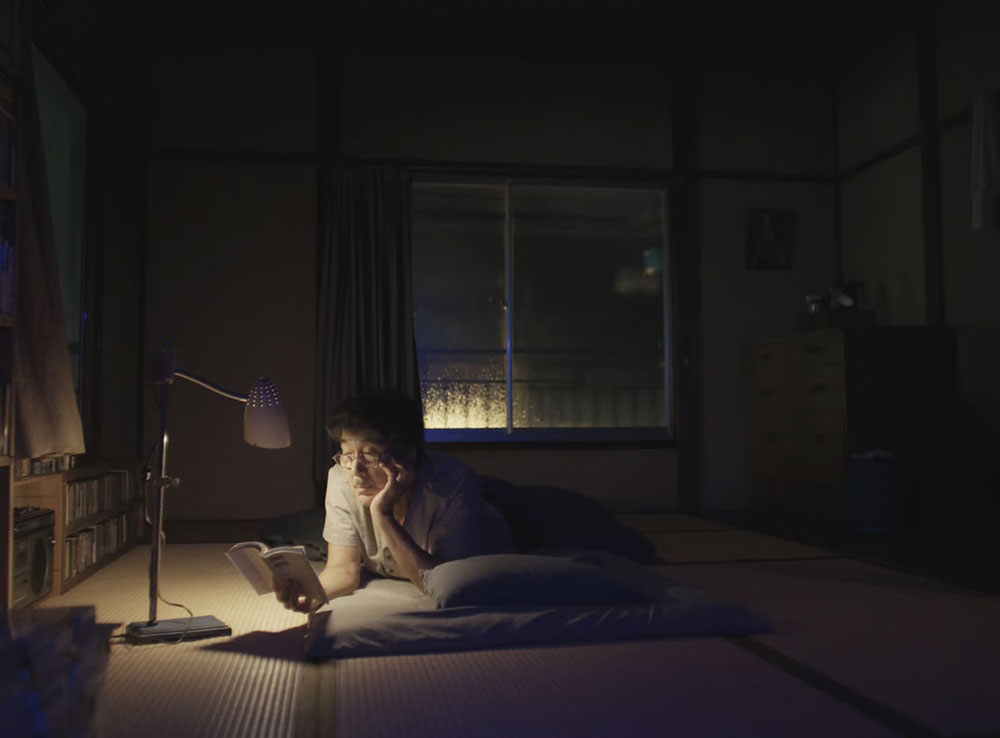
CS: I really got that sense because this film follows, like many of your films, a character on a solitary journey and we see a lot of the small things he does in his daily life. This film really puts that aspect of your work in a central place. Could you talk about making a film that focuses on these very small things like picking up your keys or getting your coffee in the morning?
WW: Takuma Takasaki, my co-screenwriter, and I realized early on that a movie about this man was going to be driven by his routine. That magically made the screenwriting almost go by itself because we had the routine as structure and every day had the same routine. He wakes up and he looks... Well, I don't want to give the movie away, but there are these little routines already when he wakes up and then when he goes down the stairs, and when he waters his flowers, and when he comes out of the house and as you said, takes his keys, gets his coffee from a machine, puts a cassette on, and drives to work. There is a routine and we try to understand it not as a negative thing, because in most of our lives routines are something we try to get rid of….It has, not necessarily a negative connotation, but an aftertaste. In Hirayama's life, routine is a good thing; it gives his life structure and that structure makes him a very free person.
We learn to fill routines with variations and sometimes you [can] just leave things out because the audience already knows the routine. After a while, we can play with the routine and show the moments before and after. [The] routine made the screenwriting for this quite simple. It took us just four weeks and then we had the basic script. It also worked [in terms of] reduction. Reduction was a key element of the film process, of the script, of the acting, of the schedule, of the way we made this film. Reduction is actually something we all can do in our lives.
We all are seduced to forget that we have the ability to reduce our needs, to reduce too much of everything that we have all the time, and therefore, that we need even more because we need to fill the hole that we have because we have too much. Anyway, reduction is a very healing idea. We try to live that in the film and we put that in the script.
CS: I noticed routine and variation a lot throughout the film. It reminded me of music, as though I was hearing verse, chorus, verse, chorus, and then variations that enter his life and become the bridge. Speaking of which, I have to talk about Lou Reed’s “Perfect Day,” which I think is one of the greatest songs ever written. Did the use of that song come up in pre-production or is that something that came later in writing?
WW: We started writing songs into the script pretty early on because we felt they were helping us tell the story. Because the movie doesn’t have much dialogue, sometimes the music helps tell the story and some of the songs fill in a few gaps. We started to write the songs into the film after I got over my concern that, as a European filmmaker, I shouldn't impose my own musical taste on my character. Takuma said, “You're crazy. We all listen to the same music that you listen to and you don't have to worry. You're not imposing anything. After all, they're all playing here: the Stones and the Kinks. They're all here and we know all this music. It was our youth as well as yours." So we put more and more music in and most of the music actually survived in the film. There's only very few [songs] that we didn't get. Music helped us structure the film and get a handle on the character.
The working title of the film was “Komorebi.” We started the film and it said “Komorebi” on the slate. But “Perfect Day” was one of the songs we selected because I love it so much and it's one of my... I loved Lou and we were good friends. His song is really one of the greatest songs ever. We played it on set and it was very good for Koji to be in the ambiance of that song. When he listened to “Perfect Day” on his cassette recorder lying on the floor one day as light was flooding over him, I just looked at Takuma. The song was so perfect, more than we could ever imagine, that we just looked at him and we both nodded. We both realized at the same time that it was the perfect title for the film. And then, of course we had to clear it. Luckily, it worked out well. That music pushed itself into becoming the title because we had it on set.
CS: I feel like you introduced the act of seeing people listen to music to cinema in a way that feels very fresh. You see the actual time and space of people listening, really listening to music. It's really profound in the final shot, where we see how music and life can coalesce and really affect someone. I've had that moment driving in the car when I hear something and there are tears, and they're neither happy nor sad, it's just life flowing from your eyes. Could you speak about people listening to music and that final scene?
WW: The Nina Simone [song at the end] was different because the lyrics to “Feeling Good” were the frontispiece of my script. I had the lyrics on the first page, before you even see the title. And I mean, this was the motto of the film because these lyrics were very much about who I imagined this character to be. In the course of making the film, we came back to our frontispiece more and more, and eventually thought it would be the ideal song to end the film. Not to begin it, but to end it.
We frantically called our music coordinator [and asked], “Is there any chance we can get the song for the film because if we shoot the last scene with that song and then we can't have it, I'm going to be devastated.” She indicated it was not out of the question. So then we shot the last scene, the very last shot of the film, with that music playing. Koji knew what she was singing about very well. It helped that he put the actual cassette in and that it was the actual song. We didn't have any means to put the car on a fancy car trailer. He was actually in Tokyo traffic and my cameraman sat in the passenger seat, really crammed in, camera on his shoulder. I was sitting in the back somewhere crammed into the car and watching the cameraman’s shot on my iPad.
It was unbelievable, the way the song filled the little car and the way Koji managed to become that song, to really interiorize those words, and in a strange way, play the song on his face. At one moment, I looked at my cameraman and I was shocked because he couldn't see the camera anymore. He was weeping like a baby. I prayed and looked at my director of photography instead of Koji's face, and I just hoped that the cameraman could hold the shot because he couldn't look through the viewfinder anymore.
When we got that shot, I said, “Do we even need another take? Isn't this perfect the way it was?” But we went through the song one more time and this time Koji really blew all of our minds. The entire team was weeping. We were not able to hold our tears back because what he did in front of us just surpassed any idea we ever had about acting.
